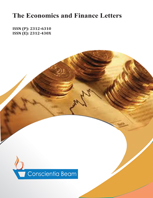Education and Income Relationship in Turkey
DOI:
https://doi.org/10.18488/journal.29/2016.3.1/29.1.8.12Abstract
This paper examines the causal relationship between four different measures of education and income in Turkey using time series data for the period 1971-2013. The four measures are: (a) gross primary-school enrolment, (b) gross secondary-school enrolment, (c) gross higher-school enrolment and (d) government expenditure on education relative to total government expenditure. The analysis employs a Toda and Yamamoto (1995) approach to Granger non-causality. The empirical findings indicate evidence of a unidirectional causality running from secondary-school enrolment to GDP per capita and higher-school enrolment to GDP per capita. The results also indicate that primary education and government spending on education do not Granger cause economic growth and vice versa.

